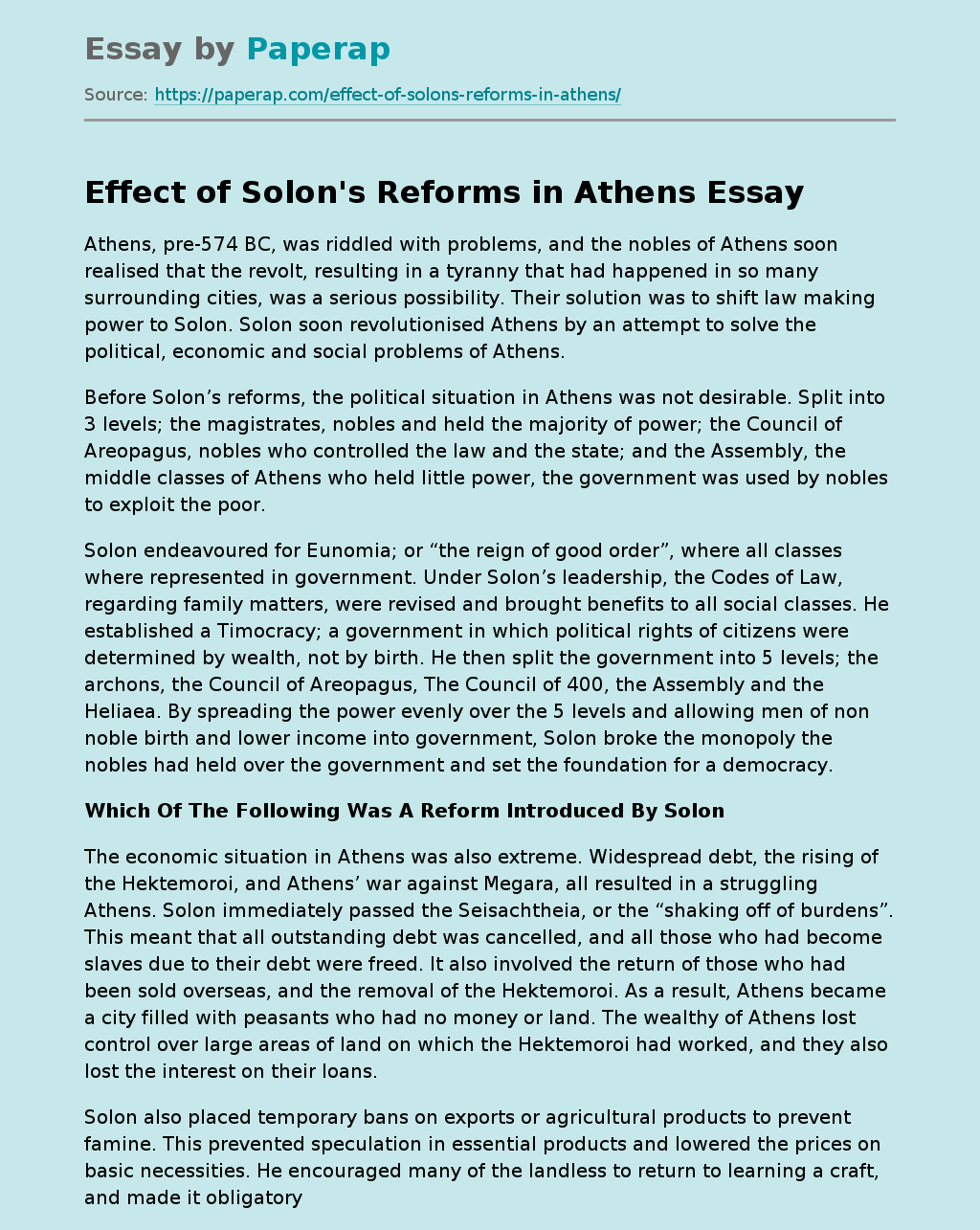Effect of Solon's Reforms in Athens
Athens, pre-574 BC, was riddled with problems, and the nobles of Athens soon realised that the revolt, resulting in a tyranny that had happened in so many surrounding cities, was a serious possibility. Their solution was to shift law making power to Solon. Solon soon revolutionised Athens by an attempt to solve the political, economic and social problems of Athens.
Before Solon’s reforms, the political situation in Athens was not desirable. Split into 3 levels; the magistrates, nobles and held the majority of power; the Council of Areopagus, nobles who controlled the law and the state; and the Assembly, the middle classes of Athens who held little power, the government was used by nobles to exploit the poor.
Solon endeavoured for Eunomia; or “the reign of good order”, where all classes where represented in government. Under Solon’s leadership, the Codes of Law, regarding family matters, were revised and brought benefits to all social classes. He established a Timocracy; a government in which political rights of citizens were determined by wealth, not by birth.
He then split the government into 5 levels; the archons, the Council of Areopagus, The Council of 400, the Assembly and the Heliaea. By spreading the power evenly over the 5 levels and allowing men of non noble birth and lower income into government, Solon broke the monopoly the nobles had held over the government and set the foundation for a democracy.
Which Of The Following Was A Reform Introduced By Solon
The economic situation in Athens was also extreme.
Widespread debt, the rising of the Hektemoroi, and Athens’ war against Megara, all resulted in a struggling Athens. Solon immediately passed the Seisachtheia, or the “shaking off of burdens”. This meant that all outstanding debt was cancelled, and all those who had become slaves due to their debt were freed. It also involved the return of those who had been sold overseas, and the removal of the Hektemoroi. As a result, Athens became a city filled with peasants who had no money or land. The wealthy of Athens lost control over large areas of land on which the Hektemoroi had worked, and they also lost the interest on their loans.
Solon also placed temporary bans on exports or agricultural products to prevent famine. This prevented speculation in essential products and lowered the prices on basic necessities. He encouraged many of the landless to return to learning a craft, and made it obligatory for the father to teach his son a trade.
These reforms took steps to making Athens a free citizen nation, but it only alleviated distress instead of eliminating the problems.
Pre 574, Athens was split up into 4 social classes; the Eupatridae, nobles that held almost all political power; the Georgoi and Demiourgoi, farmers and craftsmen who held average rights; and the Thetes, who held no political rights or land. These classes also split into clans, the constant bickering between clans often disrupting Athens. Solon’s reforms meant that all 4 classes held political power, and it was more difficult for the Eupatridae to exploit the other classes. Fighting between clans also decreased, and Athens became much more stable.
In conclusion, we can clearly see that Solon attempted to address all major issues prevalent in Athens at the time, from debt to social classes. His reforms aided the situation, but whether his reforms were practical for long term application is arguable.
Effect of Solon's Reforms in Athens. (2019, Dec 05). Retrieved from https://paperap.com/effect-of-solons-reforms-in-athens/

